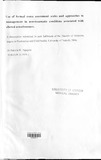| dc.contributor.author | Njuguna, Patricia W | |
| dc.date.accessioned | 2016-06-26T12:27:32Z | |
| dc.date.available | 2016-06-26T12:27:32Z | |
| dc.date.issued | 2006 | |
| dc.identifier.uri | http://hdl.handle.net/11295/96463 | |
| dc.description.abstract | Use of formal coma assessment scales and approaches to management in non- traumatic conditions associated with altered consciousness.
Background:
Altered consciousness states are a recognised sign of severity of childhood illnesses. Timely identification of altered consciousness states and appropriate immediate management is important and impacts on outcome.
Objective:
To describe the use of formal coma scales for the assessment of altered consciousness states, staff knowledge on scales and appropriate investigations and the actual use of simple investigations in children admitted with serious, non-traumatic illness commonly associated with neurological impairment
Study design:
A prospective record review (n= 170) was carried out in Kenyatta National Hospital. A nested reassessment of level of consciousness was carried out on forty children. A staff know ledge assessment (n 51) was carried out.
Results:
Overall 170 case records were reviewed. On admission, assessment using the Glasgow coma scale was used in eight percent and 38.9% in the mortality group. W hen an assessment of consciousness was made, clinicians were more comlortable using AVPU scale (41%) than the Glasgow coma scale (26%) for the assessment. According to locally applicable standards a lumbar puncture was indicated in one hundred and twenty eight children (75.1% of all child records reviewed) but performed on fifty six children (32.5%) while only five (9%) were performed within an appropriate time period. A random blood sugar was performed on fifty six children (32.9%); it was identified as an appropriate immediate investigation by twenty lour clinicians (82.8%) while a lumbar puncture was identified by four clinicians (14%) as
an immediate investigation in a febrile child with altered consciousness not due to trauma.
Conclusions:
Assessment of level of consciousness using the Glasgow coma scale is rarely used in practice: rather general and potentially misleading descriptive terms are used. Amongst children with clear indications for simple investigations to establish the cause for altered consciousness and / or assist in its treatment only a blood slide is commonly performed with a lumbar puncture rarely performed appropriately. The quality of care of children admitted to Kenyatta National hospital with altered consciousness would benefit from defining and implementing standard management
guidelines. | en_US |
| dc.language.iso | en | en_US |
| dc.publisher | University of Nairobi | en_US |
| dc.title | Use of formal coma assessment scales and approaches to management in non-traumatic conditions associated with altered consciousness | en_US |
| dc.type | Thesis | en_US |
| dc.description.department | a
Department of Psychiatry, University of Nairobi, ; bDepartment of Mental Health, School of Medicine,
Moi University, Eldoret, Kenya | |

